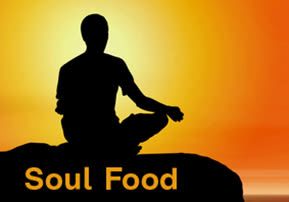
Soul Food and Kosher Eating
When we don’t give the body what it wants when it wants it, we are actually breaking the back of the evil inclination and strengthening the Divine spark within us.

I have to admit, I love food. I don’t just love it, I loooooove it! I have the appetite equivalent to three linebackers. When I was growing up, I used to eat in shifts- I’d eat a bit, leave my plate on the table, then come 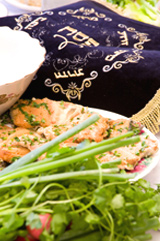 back a while later and eat some more. Then, if I were still hungry (and if there was any food left by then!), I would take another helping or two. Not only am I a champion eater, I am also a great cook! I consider myself to be quite the balabusta, especially when hosting Shabbat get-togethers. On Friday afternoon, you can enjoy the many flavorful aromas floating around my house, from my fluffy gefilte fish to my delicious matzah ball soup and, of course, my (almost) world-famous challahs. My house is like an all-you-can-eat buffet on Shabbat, because I always end up cooking way too much! I guess it’s the Jewish grandmother in me. By now you may have realized that I have a strong physical (and somewhat emotional) connection with food. I suspect I’m not alone… I am also a typical Jewish mother; if one of my family members is hungry, thirsty, tired, bored, not feeling well, or just sitting around within my field of vision, I not-so-gently offer them something to eat! When I have dinner guests, my most frequently asked questions are, “What? You’re full already? But you hardly ate!” Meanwhile, the poor guest might have had two or three helpings by then…and I hadn’t even served dessert yet! Maybe what I should really be asking my guests is, “Did you remember to bring an extra stomach?”
back a while later and eat some more. Then, if I were still hungry (and if there was any food left by then!), I would take another helping or two. Not only am I a champion eater, I am also a great cook! I consider myself to be quite the balabusta, especially when hosting Shabbat get-togethers. On Friday afternoon, you can enjoy the many flavorful aromas floating around my house, from my fluffy gefilte fish to my delicious matzah ball soup and, of course, my (almost) world-famous challahs. My house is like an all-you-can-eat buffet on Shabbat, because I always end up cooking way too much! I guess it’s the Jewish grandmother in me. By now you may have realized that I have a strong physical (and somewhat emotional) connection with food. I suspect I’m not alone… I am also a typical Jewish mother; if one of my family members is hungry, thirsty, tired, bored, not feeling well, or just sitting around within my field of vision, I not-so-gently offer them something to eat! When I have dinner guests, my most frequently asked questions are, “What? You’re full already? But you hardly ate!” Meanwhile, the poor guest might have had two or three helpings by then…and I hadn’t even served dessert yet! Maybe what I should really be asking my guests is, “Did you remember to bring an extra stomach?”
In our society, especially in Jewish culture, food is regarded as one of the most important aspects of our lives. We talk about it constantly, we think about it a lot, and we may even dream about it! Food is such an important part of our heritage, especially pertaining to the holidays and Shabbat, that we literally couldn’t make the proper connections without it! Could you imagine what a Bar Mitzvah or a wedding would be like without food? What would a Kiddush be without chulent? It would be over before it starts! When we look at our Judaism in this light, we can clearly see that food is not only an important part of many religious rituals, it is a vital and main part of those connections! Yes, it is even a mitzvah to eat! More on that later…
However, after being exposed to Rebbe Nachman’s deep and profound wisdom, I realized that I have been doing things a bit backwards! I really enjoyed listening to Rav Brody’s CD, “Healthy Eating”. Let’s begin with the spiritual reason for eating. Rav Brody explains that Hashem did not design us in order to eat for physical pleasure or to feed the body. “What?” you’re probably wondering, “we don’t eat to give the body nourishment?” Nope. We actually eat to give the soul nourishment. How is this so? Kabbalah explains that the body is the vehicle by which the soul can accomplish its mission. So eating for the body’s nourishment is only a means to an end; if the body is properly nourished, then the soul is able to do its job, and vice versa.
Now let’s discuss the spiritual aspects of food and of eating. Eating consists of two main aspects: one is what we eat, and the other is how we eat it. To begin with, let’s see why what we eat is so important. We all know kosher food has an unbelievable amount of restrictions. You can’t have this, you can’t eat this with that, you have to wait this many hours after eating that before you can have that. Whoah! It was a long and bumpy road for me to transform into an exclusively kosher eating machine. However, if we believe that each aspect of the Torah was created with Divine Intent, obviously there must be a reason for so many restrictions. I like the example that Rebbe Nachman uses when referring to the soul. He explains that the soul is like a delicate princess with a delicate, refined stomach. She can only tolerate the highest quality food, utmost in purity and freshness. Her delicate digestive system cannot handle Grade B meat. It is the same with our souls. Each soul is a Divine Spark, a literal piece of God. How can we expose such perfection to a greasy piece of pork or a crawly crustacean? From the perspective of the soul, this is no less than repulsive. Animals and animal-derived foods such as milk must be of the highest quality in order to properly nourish the soul.
According to the Torah, a kosher animal is one who chews its cud, or has fins and scales, and so on. But, looking at these two major requirements, I realized something amazing that is implied from these two guidelines- a kosher animal is not a predator! This is a very big deal! Why? Judaism is a very spiritual religion- every commandment is rooted in great spiritual secrets, and we can only begin to scratch the surface of those secrets. Rav Brody explains that by eating an animal, a person actually acquires that animal’s traits. If a person eats pork, for example, he will develop piggish behavior. Eating a predatory animal such as alligator or shark will cause a person to develop predatory, “step on others” tendencies. How do we know this is true? Well, are you familiar with the saying, “You are what you eat”? That just about sums it up! So the next time you are tempted to eat a predator, think if it is really worth turning into one yourself. Look at a cow- it is hard to name a sweeter, more docile, gentle animal. Have you ever looked into the eyes of a cow? I have, and they were so innocent and big and brown, I had to hold myself back from hugging it!
“Yes, but not all cows are kosher,” you say. You’re right- which leads me to my next point. The way an animal is killed is a very big deal in Jewish law. According to the laws of ritual slaughter, an animal is not allowed to feel any pain when it is killed. Aside from the fact that we are not allowed to cause pain to any other living creature, there is a deeper reason for these complex laws. In his book, The Coming Revolution, Rabbi Zamir Cohen reveals that the actual blood vessels are arranged in a certain way in kosher animals, as to allow for the instant and painless slaughtering. Not only that, but it has been scientifically proven that an animal who is killed in a non-kosher way feels pain. When the animal’s brain registers pain, it releases pain chemicals into the bloodstream, which then enter the animal’s muscles. So, what are you eating if you eat a non-kosher piece of steak? You’re getting an extra helping of pain, which is then absorbed into your body. This process is even more amplified in the spiritual realm. The pain felt by the animal is not only internalized in our bodies, but it also becomes a part of our souls. Now, let me ask you- do we really need to add more pain and suffering to our lives? Aren’t our lives filled with enough challenges? Conversely, by eating an animal that has not suffered at the time of its death, we are actually doing a great service to that animal. We are helping that animal achieve its spiritual correction. By eating the kosher cow, we are elevating the sparks that were trapped in that cow’s body, allowing them to reach their proper place in the spiritual realm. Rav Brody also suggests that we save meat for Shabbat and eat primarily fruits and vegetables during the week. Not only that, he also advises that chicken and turkey should be our primary sources of protein instead of red meat, as they are more easily digested by our bodies.
Kosher eating is not just about eating kosher food; it is also about eating it in a kosher way. This means we must eat in a dignified manner- sitting down, eating slowly with no distractions, and not inhaling our food in three bites or less. No one gets a prize for finishing first, unless they’re in a pie-eating contest at the fair (or at my mother’s house!). Rav Brody relates a story that when Rav Arush was four years old, he was rebuked by his older brother because he was eating while walking through the street. “What are you, a goat? Are you grazing?” asked his older brother. From that point on, Rav Arush made every effort to eat as one is supposed to. Did you know it is actually halacha to eat properly? Rebbe Nachman explains that one who eats in a proper way is actually eating in a holy way, and can actually bless others! Why? By doing so, one can raise himself to the level of a tzaddik. Think about it- when we are hungry, or we have a desire to eat a certain type of food, our body is screaming, “Give it to me right now!” Wow, that sure sounds like a 5-year-old temper tantrum! This is eating out of lust, and is one of the primary ways we cut ourselves off from The Creator.
When we don’t give the body what it wants when it wants it, we are actually breaking the back of the evil inclination and strengthening the Divine spark within us. Now we are less controlled by the Other Side and are able to let our souls guide our actions. Rav Arush states, “Eating with the intention of serving Hashem is actually low level holiness. Eating as an act of serving Hashem is far greater! There is no difference between putting on tefillin and eating in holiness. They are both mitzvot!” We can see that food is one of the vehicles through which we can create a stronger connection with God. But how exactly do we do this? Rav Brody explains that we must first say the proper blessings before eating, then eat slowly with the intention of strengthening our souls. It is important to chew slowly and wait a few seconds before taking the next bite. This really destroys the evil inclination, which is screaming at the top of its lungs, demanding another bite. A key aspect of eating according to The Rambam is to eat only 2/3 of what is on your plate, thus leaving your stomach 25% empty. Rav Brody compares the stomach to a washing machine- if the washing machine is completely full, how is it supposed to properly spin all of the laundry? Likewise, the stomach needs room to churn the food. Not only that, if a person takes 20 minutes to finish his meal, he will notice that he is satisfied just the same as if he had eaten more in those 20 minutes. It takes exactly this amount of time for our brains to register that our stomachs are full.


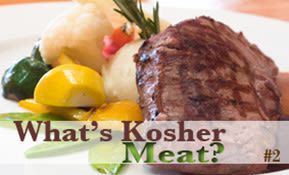


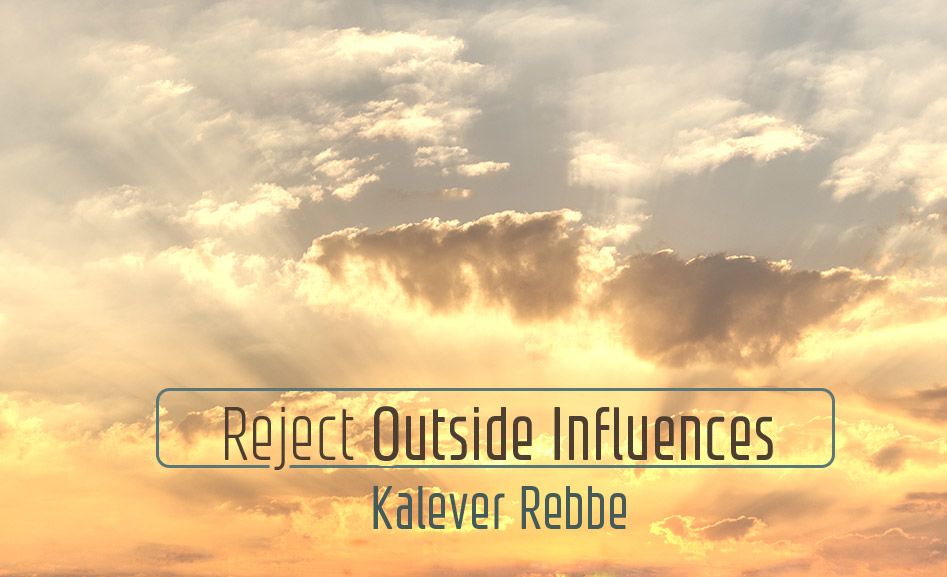

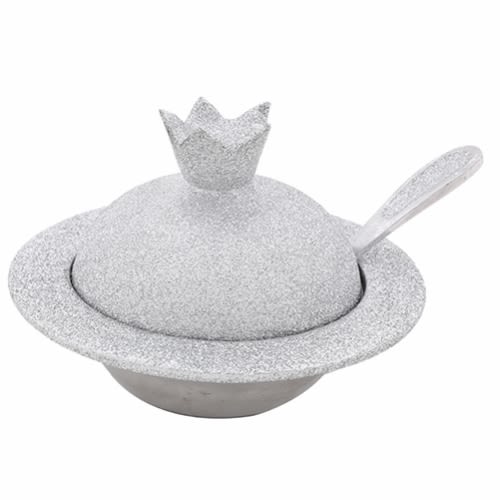




Tell us what you think!
Thank you for your comment!
It will be published after approval by the Editor.